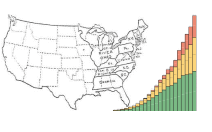The data presented on marital status in this chapter cover the 1880 to 2010 period. Data for the 1880 to 1990 period are from Michael R. Haines (2006c and 2006d) , “Sex, Age, Race, and Marital Status,” and “Singulate Mean Age at First Marriage,” Historical Statistics of the United States: Millennial Edition, Vol. 1, pp. 1-40 to 1-101, and p. 1-687, respectively. Census data on marital status were published in Census Bureau publications starting with the 1890 census. The estimates for 1880, the first year that a question on marital status was included in the census, are based the Integrated Public Use Microdata Series (IPUMS). (See Minnesota Population Center, no date, “IPUMS-USA, Frequently Asked Questions (FAQ)“)
Four categories of marital status are shown: never married, married, divorced, and widowed. Persons who were separated (for reasons of marital discord), which was introduced as a separate response category in 1950, are included here in the married category. Like all information collected in the census, information on marital status is subject to misreporting. In particular, it seems possible that the percentage of persons whose marital status is divorced is underreported, especially prior to World War II when divorce was less prevalent and less socially acceptable.
Data on the average age at first marriage are for the singulate mean age at first marriage, and are based on a procedure developed by John Hajnal (1953), “Age at Marriage and Proportions Marrying,” Population Studies, Vol. 7, No. 2, pp. 111-136, and described in Henry J. Shryock, Jacob S. Siegel, and Associates (1971), Methods and Materials of Demography, Vol. 1, pp. 294-295. The procedure yields an estimate of the average number of years lived as never married among persons who ever marry by age 50.
Figures
